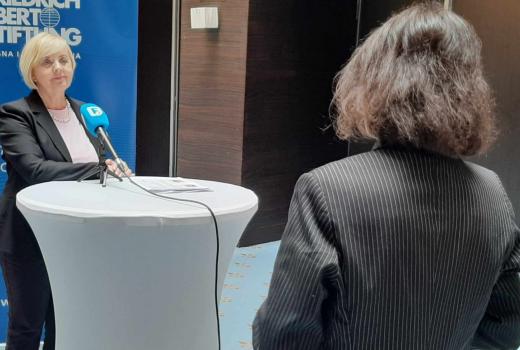
Sarajevo, May 4, 2024. – Friedrich-Ebert-Stiftung (FES) in Bosnia and Herzegovina and the BH Journalists Association presented in Sarajevo the results of a survey on the level of media freedom, as well as trust in the media among the citizens of Bosnia and Herzegovina (BiH). The research was conducted in the period from March 21 to April 11, 2024 using the CATI survey method and on a sample of 516 respondents over the age of 18.
In whole BiH, there is a worryingly large number of respondents who are not familiar with the criminalization of defamation in the RS – as many as 40 percent of those surveyed.
Almost half of respondents in Republika Srpska (RS) are not familiar with the criminalization of defamation in that entity, and in the Federation of Bosnia and Herzegovina (FBiH) that percentage is around 34 %. More than 40% of citizens in the FBiH believe that the criminalization of defamation has had a negative impact on the work of the media and journalists, and that percentage in the RS is 30%.
The vast majority of respondents in BiH does not approve any form of violence against journalists (87.4 percent), but still 12.6 percent of respondents believe that “in some cases, attacks on journalists are justified.” In the RS, more than a quarter of respondents still approve of violence against journalists – 26.4 percent of respondents, which is a significantly lower percentage than in 2023. (74.1 percent to be exact), but it is still a worrying figure. In FBiH, 5.2 percent of respondents approve of violence.
TV is slowly losing its lead over other types of media in Bosnia and Herzegovina. 39.7 percent of citizens use TV as the first source of information, while 38.6 percent use the Internet and 18.4 percent use social networks. In the RS, Internet is the first source of information for 59 percent of respondents, followed by social networks at 28.7 percent, while TV is used by only 18.5 percent of respondents. TV is still the predominant source of information for 51.5 percent of respondents in FBiH, followed by the Internet (31.6 percent), and social networks (13.2 percent).
The results for 2024 show that respondents trust the media the most (61.8 percent) and religious communities (56.7 percent), followed by the non-governmental sector (44.4 percent), the international community (45.8 percent) and government institutions in general ( 43.1 percent). Political parties and politicians enjoy the least trust among respondents – 16.6 percent of respondents trust them. Compared to 2023, citizens’ trust in the media decreased by 5 percent, and in the international community. In the RS, even half of the respondents do not trust the international community.
At the state level, more than half of respondents believe that media freedom is partially present (54.3 percent). In the RS, only 37.6 percent of respondents believe that media freedom is partially present, and slightly less (30.9 percent) believe that media freedom is completely present. In the Federation of Bosnia and Herzegovina (FBiH), a significantly larger proportion of respondents than in the RS believe that media freedom is partially present (63.8 percent), while only 10.7 percent think that it is completely present.
Respondents are almost equally satisfied with the work of the media and journalists compared to 2023. But in this part, the assessments differ significantly in entities: in the RS, two-thirds of respondents are dissatisfied with the work of the media and journalists (65.8 percent). In the FBiH, satisfaction with the work of the media and journalists increased by 10 percent.
Most respondents believe that political dependence is the biggest obstacle to media freedom (57.7 percent), followed by the general political climate – 32 percent. According to RS respondents, the two main obstacles to free journalism are political dependence (52.2 percent) and financial dependence (37.6 percent). In FBiH, 59.7 percent of respondents recognize political dependence as an obstacle to free journalism.
Source: BH journalists, MediaCentar_Online



